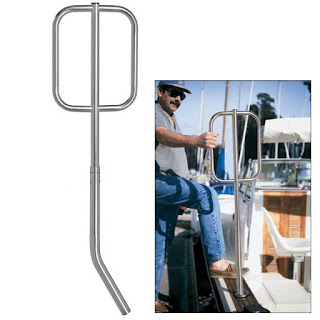Every yacht not doubt is as much a cherished home to its owner as any land based house. So are there any special needs a yacht owner needs to consider when choosing a yacht handle? Design follows function is key to choosing the right door handle or grip. The style, type and weight of yacht, whether it has been designed for racing or more extended leisure will impact the owners’ choice. The location of the handle, exposure to the sea and type and amount of use will also play a role.
 |
| From Cruiser Yachts |
Consider the impact of sea water and whether yacht is designed for cruising or racing - Corrosion by sea water or aqueous corrosion is an electrical chemical process that some alloys like stainless are better suited to resist. While platinum gold and tantalum are most resistant, their cost make stainless steel a more commonly used alloy.
Door handle manufactures will often have a selection of handles that are made from marine grade or 316 stainless steel, this is the preferred alloy as it is most resistant to pitting corrosion. This grade of stainless steel is expensive and labor intensive both to machine and polish but it is a good long term choice. If budget considerations rule this out then consider anodized lighter weight aluminum or use plastic or carbon fiber all of which are lighter in weight and less expensive. By anodizing the surface of aluminum a film is created to protect the corrosion prone aluminum from degrading. As aluminum is lighter than stainless steel it makes a better choice for racing but if racing is the primary function then consider carbon fiber as it is extremely light and very strong.
If you have decked out your yacht for cruising in what will be your home away from home then stainless steel is undeniably beautiful but a similar look can be achieved by chromium plating over a less expensive alloy like brass. Plating and anodizing both create a protective film that slows down the corrosive impact of sea water.
 |
| Boarding Handle from West Marine |
Location -The location of the door and the presence of efficient air and water filtration systems that remove any air born corrosive elements may afford the yacht owner the option of working with less corrosion resistant alloys. In those areas furthest removed from the ocean with good filtration systems the use of brass or bronze handles and wood and leather clad grips present a decorative and warmer option to steel.
 |
| Leather clad grips and levers from www.liveyachting.com |
Operating function - Consider the function of the handle, is it being used as simple grip or pull or does it need to hold a door in place by means of a latch or lock or is it being used as a winch handle. If it is a fixed grip, then provided it is sturdy there are a wide range of materials available. If this is an operational lever or knob and it will see a lot of wear and tear then stainless steel is the preferred alloy. If you go to the expense of 316 stainless steel door handle set then ask the manufacturer if the spindle that supports the lever is also made from marine grade stainless steel.
